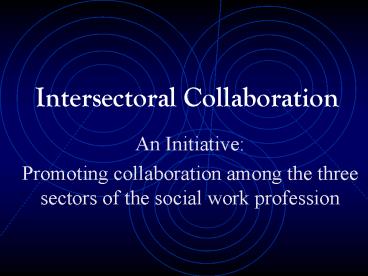Intersectoral Collaboration - PowerPoint PPT Presentation
1 / 18
Title:
Intersectoral Collaboration
Description:
... and CASWE (CASSW) signed MOU agreeing to communicate and collaborate on issues of joint concern ... Representation finally agreed on: 4 CASW. 4 CASWE ... – PowerPoint PPT presentation
Number of Views:761
Avg rating:3.0/5.0
Title: Intersectoral Collaboration
1
Intersectoral Collaboration
- An Initiative
- Promoting collaboration among the three sectors
of the social work profession
2
- The Three Sectors
- Practice Sector Education Sector
- Carries out social work Prepares
students for - practice in diverse fields skilled
and ethical - social work practice
- Regulatory Sector
- Protects the public interest
- by ensuring skilled and ethical
- social work practice
3
Background
- Social Work Forum sponsored by CASW in Montreal
in 2001 - Goal to foster better understanding of, and
respect for, the social work education,
regulatory and practice perspectives of the
profession and how they intersect, in order to
ensure that the public is well served.
4
Objectives
- To encourage and enable communication among the
three sectors of the profession - To jointly identify and prioritize common issues
- To explore potential joint plans of action to
address priority issues - To explore how to make the Forum an on-going
activity
5
Priorities Identified in 2001
- Better links among three sectors
- Protection enhancement of professional identity
- Promotion of human rights social justice
- Definition clarification of competencies
- Working in a social order based on exclusion
- Development of practice-based research
- Problems of deterioration of the workplace
6
Outcomes of Forum
- Plan of action not fully developed
- No formal commitment made to collaboration
- Numbers involved made follow-up cumbersome
- Agreement on Internal Trade became major focus
- No subsequent Forum was held
7
History of this Initiative
- June 2006 CASW board discussed renewing
initiative - November 2006 CASW and CASWE (CASSW) signed MOU
agreeing to communicate and collaborate on issues
of joint concern - Intersectoral Collaboration Working Group
established with CASW and CASWE - Initiative incomplete without participation of
regulatory sector but no equivalent national body
8
History of this Initiative (contd)
- Working group held teleconference with
representatives of all regulatory bodies - All invited to participate in face-to-face
meeting in PEI, June 2007 - Strong consensus on issues but not on
representation/participation - Working Group established a small task group to
summarize issues draft MOU - Voluntary participation in task group invited
from regulators
9
Intersectoral Task Group
- One person from each sector
- Worked from July September 2007
- Prepared background document summarising history
of initiative to date, including issues and
recommendations from PEI meeting report - Drafted Memorandum of Understanding
10
Memorandum of Understanding
- Draft circulated in fall 2007
- Teleconferences October 2007 and February 2008
- Feedback from all sources incorporated
- Representation of regulatory sector the most
difficult issue - Representation finally agreed on
- 4 CASW
- 4 CASWE
- 4 free-standing and 4 CASW regulators, pending
formation of National Council of SW Regulators
11
Memorandum of Understanding
- More formal than previous initiative
- Sets out
- Purpose
- Principles
- Commitments
- Structure
- Operational Guidelines
12
- Purpose
- to promote communication, connection and
collaboration among the three sectors (education,
practice and regulation) of the social work
profession in Canada. - Principles
- The social work profession is committed to the
fundamental goal of advancing social justice. - All clients have the right to receive skilled and
ethical social work services. - All three sectors share the goal of collaborating
to fulfill these roles.
13
- Commitments
- To work collaboratively to identify and
prioritize issues of shared concern to all three
sectors - To recognize and respect the specific roles
played by each individual sector - To recognize that differences exist in
legislation and policy within different
jurisdictions - To promote communication and collaboration among
the sectors at the national, provincial and
territorial levels.
14
- Structure
- Steering Committee to identify priority issues
equal representation from CASW, CASWE, CASW
member regulators, and free-standing regulatory
bodies - Task Groups to work on priority issues equal
sectoral representation, chaired by Steering
Committee member but may draw participants from
member groups - Consultative processes and feedback loops at both
levels
15
- Criteria for Deciding Priority Issues
- Does this issue affect all three sectors?
- Is there consensus that this issue needs to be
addressed? - Is there a role for each sector in addressing the
issue? - Will addressing the issue serve to unify and
strengthen the social work profession? - Will addressing the issue have a public
education/promotion component? - Will addressing the issue serve to build
commitment among members of the profession?
16
Some Identified Issues
- Disconnect between training/education and
conditions of work/expectation of employers - Generalist versus specialist skills
- Issues of multidisciplinary practice
- Lack of mentoring and clinical supervision for
many social workers - Recruitment and retention, particularly in remote
areas - Special needs of aboriginal communities
- Globalization and changes in national social
policy - International mobility and credentialling.
17
Potential Areas for Collaboration
- Professional education strengthen the
curriculum to prepare social workers for the
environment they will work in - Scope of practice of the social work profession
- Competencies and standards of practice (a) for
entering the profession and (b) for specific
areas of practice - Continuing education delivery, evaluation,
monitoring - Research on external challenges (such as
globalization and international mobility).
18
Where Are We Now?
- Face-to-Face Meeting May 2008
- All three sectors participating
- Focus on deciding structure for collaboration
- Prioritize an issue of concern to all
- Move forward into action!































